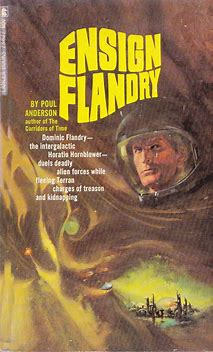CS Lewis's novel, That Hideous Strength, shows some of his characters inwardly deceiving themselves in subtle ways. In Poul Anderson's Technic History, the first story in The Earth Book Of Stormgate and the last story in The Technic Civilization Saga both present clear examples of arrogance.
In "Wings of Victory," Webner arrogantly denies that the large winged organisms on Ythri can be intelligent. Turekian realizes not only how the larger flyers can be intelligent but also that they are about to attack and must mutiny against Webner to make his point.
In "Starfog," Vandange arrogantly denies that the Kirkasanters can have come from a "universe" such as they describe, where space is a bright fog. By going there, Laure discovers that the "Cloud Universe" is a globular cluster whose orbit takes it into the inner galaxy where it periodically collects new stars and stellar matter.
Complacency is splendidly displayed by Lord Hauksberg who, when Flandry has revealed that the Merseians had gone to great lengths to conceal the imminent destruction of the star, Saxo, and of the Terran Fleet with it, by a rogue planet, has the gall to say:

7 comments:
Kaor, Paul!
I agree, Lord Hauksberg showed truly astonishing folly, blindness, and complacency about Merseia and its hostile designs against the Empire.
If Hauksberg could not be dismissed, I recall Commander Abrams saying, very well, better him than someone else with the same foolish views but who had not yet blundered. A Hausksberg who remained in the foreign ministry or the Policy Board would be pressured by realists reminding him of the disaster he nearly brought on Terra.
Ad astra! Sean
The more intelligent people are and the better-informed they are, the better they are at rationalization.
The classic example is Neville Chamberlain before 1939. His fault was a genuine horror of war (born of the experience of WW1) and an inability to believe that anyone could want war, or consider another world war worth the cost and risk.
It wasn't that he was sympathetic to National Socialism or wanted Hitler to win -- although many at the time suspected that (Orwell, for example).
It was just a desperate desire to believe that there was a way out without fighting.
Kaor, Mr. Stirling!
I believe Chamberlain was a good man, but with disastrously false to fact ideas about Hitler and Germany. IOW, confirmation bias and motivated reasoning.
Ad astra! Sean
I have seen the claim that Chamberlain was buying time for Britain to re-arm against Germany.
Kaor, Jim!
I have a vague recollection of that being suggested or discussed in Churchill's history of WW II. But I read that work too long ago to be sure.
Ad astra! Sean
In fact, Germany's advantage increased between 1938 and 1939.
It takes time to develop new models of weapons/aircraft etc., and time to work out doctrine.
In 38-39, the Germans were just reaping the results of their increased military spending 2-4 years earlier.
Kaor, Mr. Stirling!
But I thought the UK was also modernizing its own military during those years, esp. the RAF?
Ad astra! Sean
Post a Comment